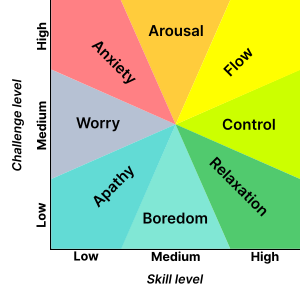Samuel Johnson once wrote, “It is by studying little things that we attain the great art of having as little misery and as much happiness as possible.”
One “little thing” that can be a source of unhappiness is boredom. Waiting in traffic. Waiting for the subway. Doing the dishes. Waiting in a doctor’s office. Listening to your thirteen year old talk through her different clothing options for the day. Boredom is an emotional state experienced when an individual is left without anything in particular to do, and not interested in their surroundings. (The first recorded use of the word boredom is in the novel Bleak House by Charles Dickens, written in 1852, in which it appears six times, although the expression to be a bore had been used in the sense of "to be tiresome or dull" since 1768. The French term for boredom, ennui, is sometimes used in English as well. I just thought you would like to know).
Boredom has been defined as “an unpleasant, transient affective state in which the individual feels a pervasive lack of interest in and difficulty concentrating on the current activity.” Normally boredom is a response to a moderate challenge for which the subject has more than enough skill.
It seems there are three types of boredom, all of which involve problems of engagement of attention. These include times when we are prevented from engaging in some wanted activity, when we are forced to engage in some unwanted activity, or when we are simply unable, for no apparent reason, to maintain engagement in any activity or spectacle. Boredom proneness is a tendency to experience boredom of all types. This is typically assessed by the Boredom Proneness Scale- yes there is such a scale. Although boredom is often viewed as a trivial and mild irritant, proneness to boredom has been linked to a very diverse range of possible psychological, physical, educational, and social problems.
Boredom is a condition characterized by perception of one's environment as dull, tedious, and lacking in stimulation. So how does one overcome boredom? Gretchen Rubin outlines her strategies to overcome boredom:
1. Put the word “meditation” after the activity that’s boring you. If you’re impatient while waiting for the bus, tell yourself you’re doing “bus waiting meditation.” If you’re standing in a slow line at the drugstore, you’re doing “waiting in line meditation.” Just saying these words can make you feel very spiritual and high-minded and wise.
2. Dig in. As they say, if you can’t get out of it, get into it. Diane Arbus wrote, “The Chinese have a theory that you pass through boredom into fascination, and I think it’s true.” If something is boring for two minutes, do it for four minutes. If it’s still boring, do it for eight minutes, then sixteen, and so on. Eventually, you discover that it’s not boring at all. If part of your research isn’t interesting —like the Dardanelles campaign for Forty Ways to Look at Winston Churchill—read a whole book about it, and then it becomes absorbing. The same principle holds when doing boring or irritating tasks, like laundry.
3. Take the perspective of a journalist or scientist. Really study what’s around you. What are people wearing, what do the interiors of buildings look like, what noises do you hear, what do the ads show? If you bring your analytical powers to bear, you can make almost anything interesting. Paradoxically, you will find that understanding the theory of why waiting in line makes you crazy will make much more tolerant of waiting in line.
4. Find an area of refuge. Have a mental escape route planned. Think about something delightful or uplifting (not your to-do list!). Review photos of your kids on your phone (studies show that looking at photos of loved ones provides a big mood boost). Listen to an audiobook.
5. Look for a way to feel grateful. It’s a lot better to be bored while waiting in a doctor’s office than to be in agony of suspense about your test results. It’s more fun to sit around the breakfast table talking about clothes than to be away from home on a business trip. Maybe the other line at the drugstore is moving even more slowly.
6. Consider people in glass houses ?: La Rochefoucauld observed, “We always get bored with those whom we bore.” Remind yourself of this when having a boring conversation with someone!
7. And of course, always bring a book (in physical or virtual form).

No comments:
Post a Comment